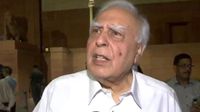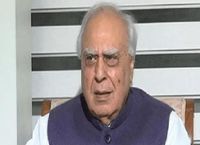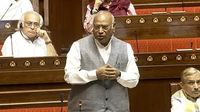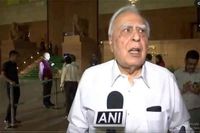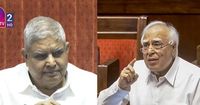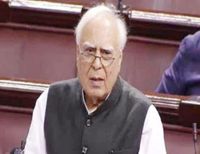On April 3, 2025, the Rajya Sabha witnessed a heated debate over the Waqf (Amendment) Bill, with opposition leaders voicing strong objections against what they deemed unconstitutional provisions targeting the Muslim community. The bill, which aims to amend the existing Waqf laws, was passed in the Lok Sabha the previous day amid significant controversy.
Congress MP Kapil Sibal was particularly vocal during the discussions, asserting that Waqf properties belong to Allah and cannot be sold. He criticized the government's interference in religious rights, questioning why the ruling party, which advocates for 'one nation, one law,' seeks to regulate the religious practices of Muslims. "If I give away half of my properties to Waqf, no one should have a problem with that," Sibal remarked, emphasizing the sanctity of Waqf lands.
Sibal's comments were met with a rebuttal from Rajya Sabha Chairman Jagdeep Dhankhar, who dismissed Sibal's claims regarding Hindu inheritance rights, stating that land can be donated to anyone. Sibal countered that while properties held in trusts can be sold, Waqf properties are sacred and should remain within the community.
During the debate, Congress MP Imran Pratapgarhi labeled the Waqf Bill as unconstitutional and accused the BJP of trying to usurp Waqf lands. He highlighted the absence of Muslim representation in the Lok Sabha, questioning the government's commitment to minority rights. Pratapgarhi asserted, "The Waqf land also belongs to the nation, like defense and railway land. This bill alienates Waqf and Muslims among Indians."
Abhishek Manu Singhvi, another Congress leader, criticized the bill for lacking substantive reforms and claimed it undermines constitutional rights. Singhvi stated, "This bill can be challenged in court under Article 26, which guarantees the freedom to manage religious affairs." He further argued that the legislation does not provide the autonomy that Waqf institutions require.
Samajwadi Party leader Ram Gopal Yadav echoed these sentiments, warning that the bill violates Article 26 of the Constitution. He urged the government to treat all religions equally and not to target the Muslim community with such legislation.
Meanwhile, Union Minister Kiren Rijiju defended the Waqf Bill, asserting that it aims to enhance transparency and governance in Waqf property management. He stated, "The right use of Waqf can transform India," and emphasized the need for legal oversight to prevent misuse of Waqf properties. Rijiju also announced that the bill would be renamed the UMEED (Unified Waqf Management Empowerment Efficiency and Development) Bill.
In a contrasting view, Congress President Mallikarjun Kharge condemned the bill as a tool to torment minorities and argued that it does not differ significantly from the 1995 Act, apart from certain clauses that could infringe on individual rights. He stated that the legislation was passed without garnering substantial support, with 288 members voting in favor and 232 against it.
Opposition voices were further amplified by Trinamool Congress MP Sushmita Dev, who described the bill as a legislation of mistrust, and CPI(M) MP John Brittas, who accused the government of attempting to grab Muslim land. Brittas asserted, "Just because the BJP governs the country does not mean all the land belongs to it."
During the debate, BJP leaders attempted to counter the opposition's claims. JP Nadda, the BJP President, criticized the opposition for sensationalizing the issue and asserted that the bill was necessary to regulate Waqf functioning and protect stakeholder rights. He claimed that the bill would not interfere with religious beliefs but would streamline Waqf management.
In a broader context, Congress MP Syed Naseer Hussain accused the BJP of fueling communal polarization for electoral gains, stating, "This bill is based on total falsity and a misinformation campaign by the BJP." He emphasized that the properties in question are historically significant and questioned how the government could demand proof of their legitimacy.
As the debate unfolded, the opposition raised concerns about the implications of the bill for India's secular fabric. They argued that such legislation could set a dangerous precedent for targeting minority communities in the future. RJD MP Manoj Jha criticized the government for experimenting with the Muslim community and called for equal treatment across all religious groups.
Despite the pushback from various factions, the government maintained that the Waqf (Amendment) Bill is essential for modernizing Waqf property management. Rijiju highlighted the vast scale of Waqf properties in India, stating, "As of today, there are 8.72 lakh Waqf properties," and emphasized their potential for generating significant revenue.
The debate around the Waqf (Amendment) Bill raises critical questions about the balance between governance and religious rights in India. As the discussions continue, the implications of this legislation for minority rights and community relations remain a focal point of contention.
